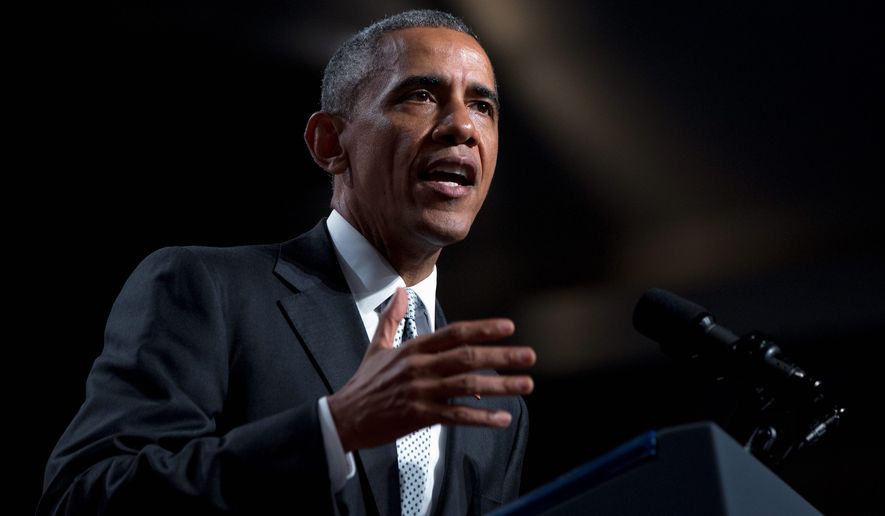Obamacare stretches into much of the U.S. economy, and outright repealing it, as Republicans are gearing up to try one last time, would be a tricky proposition, according to the latest estimates from Congress’ official scorekeeper.
Although a repeal would boost the economy, it would add tens of billions of dollars to the deficit over the next decade as Washington loses out on the hefty tax increases imposed at President Obama’s insistence.
More than 20 million people no longer would be covered by health care plans, the Congressional Budget Office calculated in a report released Friday.
Republicans who back the repeal, the report said, would come under intense pressure to find ways to extend better health care coverage without the massive federal bureaucracy created by the Affordable Care Act.
“In the five years since its enactment, nearly every key provision of the law has taken effect and has been incorporated into final rules and other administrative actions,” the CBO said. “Undoing the ACA would thus be quite complicated.”
Timothy Jost, a law professor at Washington and Lee University who closely tracks the law, summed it up more succinctly: “The Affordable Care Act is baked into our health care system.”
With the Supreme Court potentially poised to slice out the heart of Obamacare in a ruling on whether the administration has been breaking the law in paying subsidies to customers in most states, Republican leaders say they have one big chance to try for another repeal of the 2010 law.
The CBO report gave them some ammunition by calculating that the law drags down the economy by enticing millions of workers to cut back hours or drop out of the labor force altogether to get better benefits from the federal government.
“At a time when participation in the labor force is at an alarmingly low rate, getting rid of Obamacare’s harmful regulations, mandates and taxes would give job creators and job seekers greater opportunity,” said Rep. Tom Price, Georgia Republican and House Budget Committee chairman.
But it would come at a price to the federal budget: $137 billion in deeper deficits over the next decade, the CBO calculated. If the better economy isn’t considered — a calculation method to which Democrats and some budget analysts object — the added deficits could top $300 billion in 10 years.
The problem for Republicans is that repealing Obamacare means also getting rid of the tax increases in the law and getting rid of spending cuts such as those to Medicare. Combined, the tax increases and spending cuts have been more than enough to cover Obamacare’s costs.
Democrats said that alone is a reason to keep the law intact.
“Any way you slice it, repealing the Affordable Care Act will add hundreds of billions of dollars to the deficit,” said House Minority Leader Nancy Pelosi, California Democrat.
In addition to deeper deficits, repeal would leave millions more without health care coverage: By 2020, 23 million are expected to get insurance through Obamacare’s exchanges, and another 14 million would be covered by Medicaid or the Children’s Health Insurance Program. Repeal would eliminate that coverage — though about 12 million would either buy their own insurance or enroll in plans through their employers, meaning a net of about 25 million fewer insured.
Undeterred, Republican leaders said the law needs to be stopped.
“While CBO’s report notes that the deficit impact of repealing the law is highly uncertain, and could even reduce the deficit, it does show that repealing this law will boost nationwide employment and grow the economy,” said Senate Budget Committee Chairman Michael B. Enzi, the Wyoming Republican who requested the report.
Republicans are hatching a strategy to repeal all or part of Obamacare through a fast-track tool known as “budget reconciliation,” which would allow the Senate to pass legislation on a simple majority vote.
Mr. Obama could veto whatever bill Congress produces, and Republicans must prove to the Senate’s referee, the parliamentarian, that their efforts would reduce — not raise — the deficit.
“Two pieces of this will make it harder for Republicans to use reconciliation. The smaller piece is that this decade they have to make up about $140 billion. The larger piece is that they need repeal legislation to not increase the deficit in the second decade,” said Marc Goldwein, vice president at the Committee for a Responsible Federal Budget.
How Republicans use the tool will depend on the Supreme Court’s decision this month in the case challenging Obamacare subsidies.
If those subsidies are struck down, the CBO said, estimates would have to be revised to reflect the decrease in government spending and repeal-induced savings, “although the magnitude of those reductions is uncertain and would depend in part on the specific details of the Court’s opinion.”
• Tom Howell Jr. can be reached at thowell@washingtontimes.com.




Please read our comment policy before commenting.